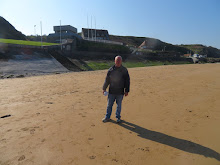 Today at 11:00 am, the WWI Memorial on the National Mall honoring the 499 DC residents killed in World War One will be re-dedicated after being restored (it literally lay in the weeds and brush unnoticed for decades). Almost a century ago The Greatest War ended, presaging an even greater war the sons of its participants fought which would catapult America out of the depression and usher in a half-century of American dominance. Paul Fussell's great 1975 book, The Great War and Modern Memory, describes how World War I still resonates today. My grandfather fought in that conflict. (Left: The DC WWI Memorial.)
Today at 11:00 am, the WWI Memorial on the National Mall honoring the 499 DC residents killed in World War One will be re-dedicated after being restored (it literally lay in the weeds and brush unnoticed for decades). Almost a century ago The Greatest War ended, presaging an even greater war the sons of its participants fought which would catapult America out of the depression and usher in a half-century of American dominance. Paul Fussell's great 1975 book, The Great War and Modern Memory, describes how World War I still resonates today. My grandfather fought in that conflict. (Left: The DC WWI Memorial.)The greatest novel of the First World War is All Quiet on the Western Front by Erich Maria Remarque (the basis for the 1930 Academy Award winning film by Lewis Milestone) and the greatest film is Paths of Glory by Stanley Kubrick (based upon Humphrey Cobb's 1935 novel). The greatest explanation of the complex run-up to the war is Laurence Lafore's The Long Fuse (1971), the greatest military history is B.H. Liddell Hart's The Real War (1930), the greatest short work is A Short History of World War I (1981) by James Stokesbury and the greatest battle depiction is The Price of Glory: Verdun 1916 (1962) by Alastair
 Horne. The greatest anti-war novel is Johnny Got His Gun (1939) by Dalton Trumbo. (Right: Grandfather Lamberton.)
Horne. The greatest anti-war novel is Johnny Got His Gun (1939) by Dalton Trumbo. (Right: Grandfather Lamberton.)Some fine also-rans, reflective of the Great War's relegation to mere second place disaster of the 20th Century by the Second World War, are One of Ours (novel) by Willa Cather, winner of the 1923 Pulitzer Prize, The Blue Max (1966 film), The Guns of August (also called August 1914, Pulitzer Prize winner for 1963) by Barbara Tuchman, The Great War (1959) by Cyril Falls, A Concise History of World War I (1964) by Ernest Esposito, In Flanders Field: Passchendaele 1917 (1958) by Leon Wolff and The Good Soldier Schweik (1930) by Jaroslav Hasek.
As an aside, Ladislas Farago's 1963 biography of World War Two's old blood and guts general, Patton: Ordeal and Triumph, has a great section on this legendary warrior's baptism in battle in World War One. Also great at showing how the impersonal nature of war destroys individuality are Ernest Hemingway's 1929 novel A Farewell to Arms and its 1932 film adaptation starring Gary Cooper.
There's a lot to learn about and from The War to End All Wars. As British Foreign Secretary Sir Edward Grey said on the eve of the destructive European self-conflagration, "The lamps are going out all over Europe and I doubt we shall see them lit again in our lifetime." England was the world's premier economic power in 1914, by 1918 London had been replaced as the world's financial center by New York, where the tail still wags the dog.
The opening stanza of John McCrae's 1915 poem In Flanders Field is portentous:
In Flanders Field the poppies blow
Between the crosses, row on row
That mark our place; and in the sky
The larks, still bravely singing, fly
Scarce heard among the guns below

No comments:
Post a Comment